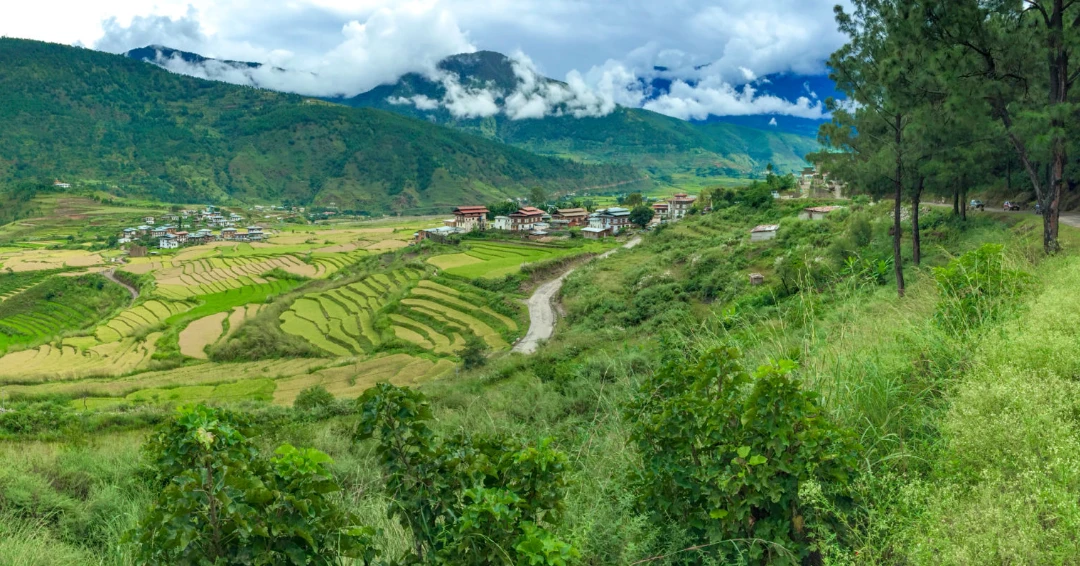Nestled in the eastern Himalayas, Bhutan emerges as a captivating destination that blends pristine natural beauty with profound cultural heritage, offering Belgian travelers an opportunity to escape the familiar rhythms of European life and immerse themselves in a world of serenity and spirituality. Often referred to as the "Land of the Thunder Dragon," Bhutan is a small, landlocked kingdom where ancient traditions coexist harmoniously with mindful modernization, guided by the unique philosophy of Gross National Happiness. For Belgians accustomed to the bustling cities of Brussels or Antwerp, Bhutan presents a stark yet refreshing contrast: imagine trading the flat landscapes and historic cobblestone streets of Belgium for towering mountain peaks, lush valleys, and fortress-like monasteries perched on cliffs. Both nations share intriguing parallels as compact countries with rich histories—Belgium, with its constitutional monarchy and multilingual society, mirrors Bhutan's own transition to democracy in 2008 under a beloved king, while both prioritize environmental conservation, with Bhutan boasting over 70% forest cover and Belgium leading in sustainable urban initiatives. Diplomatic ties between Belgium and Bhutan were established on January 21, 2009, making Belgium the first country to formalize relations with Bhutan post-democracy, fostering cooperation in areas like development aid and cultural exchange. This relationship underscores a mutual respect for preserving identity amid global influences, inviting Belgian visitors to discover Bhutan's unspoiled allure not as mere tourists, but as thoughtful guests in a kingdom that values quality experiences over mass tourism. As an experienced Bhutanese travel consultant, I assure you that a journey here promises transformative insights, from hiking sacred trails to witnessing vibrant festivals, all while navigating practicalities tailored for those unfamiliar with Himalayan adventures.
Visa and Entry Requirements
Bhutan's tourism policy is deliberately controlled to preserve its environment and culture, mandating that all foreign visitors, including Belgians, must book their trips through licensed Bhutanese tour operators rather than traveling independently. This approach ensures sustainable practices and minimizes overtourism, aligning with the kingdom's ethos of high-value, low-impact experiences. For Belgian tourists, obtaining a visa involves a straightforward eVisa process handled entirely by your chosen tour operator, who will submit your application to the Department of Immigration upon receiving full payment for the tour package. Required documents typically include a scanned copy of your passport (valid for at least six months beyond your planned stay), a recent passport-sized photo, and proof of travel insurance covering medical emergencies and evacuation. The visa fee itself is a modest USD 40 per person, but it is intrinsically linked to the Sustainable Development Fee (SDF), a daily levy that funds Bhutan's free education, healthcare, and conservation efforts. As of 2025, the SDF stands at USD 100 per adult per night, with a reduced rate of USD 50 for children aged 6 to 12, and exemption for those under 6; this fee is incorporated into your tour cost and applies until at least September 2027. Once approved—usually within 72 hours—your visa clearance letter is emailed, which you present upon arrival at Paro International Airport for the visa stamp. This system not only streamlines entry but also guarantees that your visit contributes directly to Bhutan's well-being, allowing Belgian travelers to focus on anticipation rather than bureaucracy.
Travel Routes from Belgium to Bhutan
Reaching Bhutan from Belgium requires careful planning due to the absence of direct flights, with most journeys involving one or two transits through major Asian hubs, offering Belgian travelers a chance to break up the long haul with brief layovers. From Brussels Airport (BRU), the primary gateway, popular routes include flying via Delhi (India) with airlines like Air India or Vistara, via Bangkok (Thailand) with Thai Airways, or via Doha (Qatar) with Qatar Airways, before connecting to Paro International Airport (PBH) on Bhutan's national carriers, Druk Air or Bhutan Airlines—the only two airlines authorized to operate into Paro due to its challenging high-altitude runway nestled in a narrow valley. Flights from Antwerp or other Belgian cities typically route through Brussels, with total travel time averaging 15 to 20 hours, including layovers. Paro Airport's operations are limited to daylight hours and visual flight rules, making it susceptible to weather-related delays, particularly during monsoon seasons when fog or winds can ground planes; thus, building flexibility into your schedule is advisable. Bookings should be made well in advance, ideally through your tour operator who can coordinate seamless connections and handle any disruptions. Realistic expectations include potential jet lag from the time difference (Bhutan is 5 hours ahead of Belgium in summer, 6 in winter) and the thrill of Paro's dramatic landing, often described as one of the world's most scenic yet demanding approaches, ensuring your arrival feels like the beginning of an epic adventure.
Best Time to Visit and Seasonality
Bhutan's diverse topography creates varied microclimates across its seasons, influencing everything from weather patterns to cultural events, and Belgian travelers should align their visits with personal preferences for activities and tolerance for crowds. Spring (March to May) brings mild temperatures ranging from 10°C to 20°C in valleys like Paro and Thimphu, with blooming rhododendrons painting the landscapes in vibrant hues, ideal for trekking and birdwatching amid clear skies; however, occasional showers can occur, and pollen might affect allergy sufferers. Summer (June to August) introduces the monsoon, with heavy rains (up to 500mm monthly) leading to lush greenery but also landslides on roads and leeches in forests, making it less favorable for outdoor pursuits though perfect for those seeking solitude and lower costs. Autumn (September to November) stands out as the prime season, offering crisp air (5°C to 15°C), azure skies, and harvest festivals like the Thimphu Tshechu, where mask dances and rituals showcase Bhutan's spiritual depth; this period sees higher visitor numbers but rewards with unobstructed Himalayan views. Winter (December to February) delivers cold snaps (down to -5°C at higher elevations) with possible snow, suiting hardy travelers interested in quieter explorations or festivals like the Punakha Drubchen, though passes may close due to ice. For Belgians escaping Europe's chill, autumn is recommended for balanced weather, fewer crowds than peak festivals, and optimal conditions for hiking or cultural immersion, ensuring a memorable trip without extreme discomfort.
Money, Costs, and Payment Methods
Navigating finances in Bhutan revolves around its currency, the Bhutanese Ngultrum (BTN), which is pegged one-to-one with the Indian Rupee (INR) and used interchangeably, providing Belgian travelers with a straightforward yet cash-reliant system. Exchange facilities are available at Paro Airport, major banks in towns like Thimphu and Paro, and some hotels, where euros can be converted, though carrying USD in clean, post-2006 bills yields the best rates; avoid relying solely on ATMs, as they are sparse outside urban areas and may charge fees (around BTN 500 per withdrawal) while accepting Visa and Mastercard but not always Maestro. Credit cards are increasingly accepted in upscale hotels and souvenir shops, but for local markets or small eateries, cash is king, so plan to withdraw in larger towns. Tour packages, mandatory for foreigners, typically cover accommodations, meals (three per day), internal transport, a licensed guide, and entrance fees, with costs influenced by the SDF and group size—expect USD 250-300 per day per person for standard tours. Extras include alcoholic beverages, tips (USD 10-15 daily for guides and drivers), personal shopping, and optional activities like hot stone baths, so budgeting an additional USD 50-100 daily is prudent. This all-inclusive model simplifies expenses, allowing Belgians to immerse in experiences without constant financial worries.
Health, Safety, and Travel Insurance
Health considerations in Bhutan center on its high-altitude terrain and remote locations, demanding Belgian travelers to prepare proactively for potential issues like altitude sickness, which can manifest as headaches, nausea, or fatigue above 2,500 meters—common in places like Thimphu (2,300m) or Dochula Pass (3,100m). Medical facilities are basic, with well-equipped hospitals in major towns but limited in rural areas, emphasizing the need for comprehensive travel insurance that includes emergency evacuation by helicopter, as road ambulances may be slow on winding paths. Recommended vaccinations include hepatitis A, typhoid, and tetanus boosters, plus rabies pre-exposure if planning animal interactions; consult a travel clinic in Belgium 4-6 weeks prior. Bhutan boasts exceptional safety with negligible crime rates, thanks to its close-knit communities and Buddhist values, but minor risks like stray dogs (carry a stick for deterrence) or uneven trekking trails warrant caution—stick to guided paths and wear sturdy shoes. Overall, the kingdom's peaceful ambiance allows worry-free exploration, provided insurance covers all eventualities.
Cultural Etiquette and Social Expectations
Bhutan's society is deeply rooted in Buddhist principles of respect, humility, and harmony, requiring Belgian travelers to adapt their behaviors to foster meaningful interactions and avoid unintentional offenses. In temples and monasteries, dress modestly—long pants, covered shoulders, and no hats or shoes upon entry—while walking clockwise around sacred structures and refraining from pointing at deities or monks. Public displays of affection are uncommon, and patience is prized in a culture where time flows unhurriedly; Belgians, known for directness, might need to soften approaches, using polite phrases like "kuzuzangpo la" (hello) to build rapport. Humility shines through in accepting offerings with both hands or touching forearms, and avoiding loud voices or aggressive bargaining, which contrasts with some European negotiation styles. These nuances enhance immersion, turning visits into respectful exchanges that honor Bhutan's gentle ethos.
Connectivity, SIM Cards, Internet Access
Staying connected in Bhutan balances modern conveniences with its rugged geography, where Wi-Fi is reliably available in hotels and cafes in urban centers like Thimphu and Paro, though speeds may lag in remote valleys. For mobile data, Belgian travelers can purchase local SIM cards from B-Mobile (Bhutan Telecom) or TashiCell at Paro Airport or town outlets, requiring a passport copy and visa; tourist packages offer data plans starting at BTN 200 for 2-6GB valid for 7-30 days, ensuring coverage in most tourist areas via 4G networks. No major restrictions affect Belgian apps, but a VPN can bypass occasional geo-blocks or enhance privacy on public networks. This setup allows seamless communication, from sharing photos to navigating, without excessive disruption.
Language and Communication
While Dzongkha serves as Bhutan's national language, English is the medium of instruction in schools and prevalent in tourism, easing interactions for English-speaking Belgians; licensed guides are fluent in English, providing insightful commentary on history and customs. For those preferring French, Dutch, or German—Belgium's official languages—specialized guides are available upon request through tour operators, though less common and potentially incurring extra fees. Language barriers in rural areas can be bridged with simple gestures, smiles, or translation apps, encouraging travelers with limited English to learn basic Dzongkha phrases for warmer engagements. This linguistic accessibility underscores Bhutan's welcoming nature, facilitating deep cultural connections.
Packing and Preparation Advice
Packing for Bhutan demands versatility to handle its fluctuating Himalayan climates, from warm valley days to chilly mountain nights, advising Belgian travelers to prioritize layers and practical items unfamiliar in Europe's milder conditions. Essential clothing includes breathable long-sleeve shirts, sturdy hiking pants, a waterproof jacket for sudden rains, thermal underlayers for evenings (temperatures can drop to 0°C), and comfortable walking boots for trails—avoid heavy luggage as tours involve light trekking. Personal items like sunscreen (high UV at altitude), insect repellent, reusable water bottle (to reduce plastic), and a headlamp for potential power outages are crucial; medications should cover altitude sickness (acetazolamide if prescribed), diarrhea, and allergies, plus a first-aid kit. Power adapters for type D/F/G sockets (230V, round pins) and a portable charger accommodate unreliable electricity. These preparations ensure comfort amid Bhutan's variable weather, enhancing enjoyment of its natural wonders.
Bhutan’s Unique Tourism Philosophy
At the heart of Bhutan's tourism lies the philosophy of Gross National Happiness (GNH), a visionary framework introduced by the Fourth King in the 1970s, prioritizing collective well-being over economic growth and shaping policies that favor quality visitors over quantity. This approach manifests in controlled entry, mandatory guided tours, and the SDF, which channels funds into preserving biodiversity, cultural heritage, and community development—Belgian travelers will appreciate how GNH limits infrastructure sprawl, maintaining unspoiled landscapes unlike more commercialized destinations. By capping modernization, Bhutan safeguards its identity, encouraging mindful tourism that fosters genuine connections rather than superficial visits, inviting Belgians to reflect on sustainable living in a world often driven by GDP.
Mindset and Expectations for Visitors
Adjusting expectations is key for Belgian travelers, as Bhutan's slower pace contrasts with Europe's efficiency, emphasizing spiritual fulfillment over material luxuries. Infrastructure is modest—small family-run hotels offer comfort but not five-star opulence, and nightlife is absent, replaced by serene evenings under starry skies. Without high-end shopping malls or fast-paced entertainment, focus shifts to nature hikes, monastery visits, and cultural exchanges, rewarding those open to simplicity. Embrace this as an invitation to unplug, finding joy in Bhutan's unhurried rhythm that rejuvenates the soul.
Food and Dining Culture
Bhutanese cuisine reflects the kingdom's agrarian roots and Himalayan influences, featuring bold, spicy flavors from chilies, cheese, and simple staples that Belgian palates might find adventurous yet comforting in their wholesomeness. Signature dishes like ema datshi (chilies in cheese sauce) pair with nutty red rice, while momos (dumplings) and suja (butter tea) embody hospitality—meals are communal, often eaten with hands, fostering bonds. Alcohol like ara (rice wine) is enjoyed moderately, and vegetarian options abound due to Buddhist ethics. Dining highlights generosity, turning every meal into a cultural dialogue.
Festivals, Religion, and Sacred Places
Religion permeates Bhutanese life through Vajrayana Buddhism, with festivals (Tshechus) honoring Guru Rinpoche via mask dances and rituals at dzongs, offering Belgian travelers profound insights into spiritual devotion. At sacred sites, observe rules like modest dress and clockwise circumambulation, enhancing appreciation of these experiences as gateways to Bhutan's soul.
Hidden Challenges and Practical Inconveniences
Bhutan's charm includes minor inconveniences like winding roads causing motion sickness, occasional power outages in remote areas, or itinerary tweaks due to weather—all framed as authentic elements of its preserved authenticity, cultivating patience as a virtue.
Shopping and Souvenirs
Shopping in Bhutan centers on artisanal crafts like handwoven textiles and incense, found in markets without high-end malls; bargaining is subtle, ensuring authentic mementos that support local artisans.
Altitude Awareness and Physical Preparedness
Altitude affects individuals variably, with symptoms like dizziness mitigated by hydration, gradual acclimatization, and moderated activity—essential for enjoying Bhutan's heights safely.
Security, Safety, and Emergency Information
Bhutan's safety is exemplary, with low risks; emergencies dial 112 (ambulance) or 113 (police), and Belgian support via the embassy in New Delhi, respecting local laws for a secure visit.
Photography and Drones
Photography is welcomed outdoors but prohibited inside religious sites; drones require permits and are restricted near sensitive areas, promoting respectful capturing of Bhutan's beauty.
What Bhutan Does Not Have
Bhutan lacks skyscrapers, fast-food chains, casinos, and mega-malls, embracing these absences as guardians of its tranquil, authentic essence.
Important Questions to Ask Before Booking a Tour
Before committing to a tour operator, Belgian travelers should inquire about their licensing with the Tourism Council of Bhutan to ensure legitimacy and adherence to standards. Ask how flexible the itinerary is, particularly for personal interests like trekking or festivals, and what accommodations entail—request details on hotel categories, locations, and amenities to match your comfort level. Probe into the guide's expertise, including language proficiency in English or possibly French/Dutch, and their experience with Belgian groups for tailored insights. Discuss meal inclusions, dietary accommodations for preferences or allergies, and options for local cuisine experiences. Inquire about emergency protocols, such as medical support or evacuation plans, and confirm if the operator assists with travel insurance recommendations. Clarify SIM card procurement for connectivity, tipping customs (typically voluntary but appreciated), and any hidden costs for extras like beverages or optional activities. These questions foster transparency, ensuring a seamless, personalized journey.
Conclusion
In reflection, Bhutan stands as a rare sanctuary for Belgian travelers yearning for depth beyond the ordinary, where cultural richness, breathtaking nature, and spiritual tranquility converge to offer respite from the world's haste. This kingdom's commitment to Gross National Happiness invites you to rediscover joy in simplicity, making it an unparalleled choice for those seeking meaningful, non-commercialized adventures.

